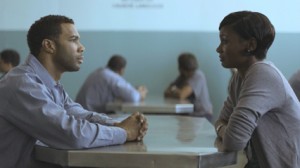

By Kim Voynar Voynar@moviecitynews.com
TIFF12 Review: Middle of Nowhere
Middle of Nowhere, Ava DuVernay’s quiet, reflective film, starts out with an interesting premise and builds from there with some strong performances and thoughtful cinematography that effectively evokes the desperation and sorrow of its protagonist, a young woman with a promising future who puts her life on hold when her husband is sent to prison. Ruby (Emayatzy Corinealdi), drops out of medical school to work as an nurse for the duration of husband Derek’s (Omar Hardwick) prison sentence, which she convinces herself will be reduced to four years for good behavior, if only he can stay out of trouble. In a sense, Ruby is imprisoned too, though she puts herself into a prison of her own making by her choice to stand by the man she loves, and as the likelihood of Derek’s early release looks bleaker and bleaker, Ruby finds herself questioning the path she’s taken.
Derek wants to stay out of trouble, no doubt, and get the hell of there, but he’s also caught in the reality of being in prison, which is that it’s just not always possible to go about your business and keep your head down without putting your own safety in danger. He also knows that Ruby needs to follow her dream and stay in med school – it’s established early on that Ruby is by far the smartest one in the room — and that if she could just stay in school she’d achieve her goal of becoming a doctor. But Ruby, for reasons that, frankly, rather baffled me as much as they do those close to her, decides she has to continue working in nursing while Derek’s away. After all, she has to keep a roof over her head, and pay off the hefty fees for Derek’s attorney.
Ruby’s sister Rosie (Edwina Findley), a struggling single mom, supports Ruby emotionally while being jealous that Ruby has someone who loves her, even if he is in prison; their tough-love mom, Ruth (Lorraine Toussant) loves her daughters, but can barely contain her disappointment and anger over Rosie’s single mom status and Ruby’s choice to drop out of med school. Still, Ruby toils along, day by day, until the day she meets Brian (David Oyelowo), a kind-hearted bus driver who wants to take Derek’s place in Ruby’s tumultuous life. Ultimately, Ruby has to make a choice: Be true to her marriage, in spite of everything? Take a chance on a new life with Brian? Or find her own path?
DuVernay’s become something of an icon among the African-American filmmaking community over the past several years. She won the Best Director laurels at Sundance this year, making her the first African-American woman to do so, and is the organizer of the African-American Film Festival Releasing Movement film collective, which organizes efforts for festival submissions and coordinates theatrical releases for films made by African-American filmmakers. She’s becoming quite the powerhouse, known for her passion in articulating her ideas around distribution and minority filmmaking. She’s also, it turns out, a fine writer and director, displaying an able, controlled hand in directing her cast and weaving a story about a strong female protagonist who just needs to find her way. Keep an eye out for DuVernay, this woman is on the move … and she’s not waiting for Hollywood to give her permission to do exactly what she wants to do.
















Couldn’t have said it better myself! Love the film, love the woman. A definite must see!
I loved this film and hope others see as well. Everything flowed well. The dramatic scenes where Ruby sits and thinks brings the reader in, and made we wonder how I wouldwould handle her situation.
This film was incredible! I had tears by the end it moved me so much. The cinematography (the shots, the shifting focus, the lighting), the soundtrack, the acting…… I don’t mean to build it up for you, just GO SEE THE FILM. And if you like it, tell a friend. We should support such low-budget filmmaking.
Excellent personal story. Touches the hart time and time again
Nicole, exactly.
If you love indie film, support it by going to see films in theaters. Take a friend, tell a friend. That should be our guiding mantra.
Ava and her team have raised the bar. This is an amazing film in every way—-from the images, the story and the acting. Bravo to all!!!!